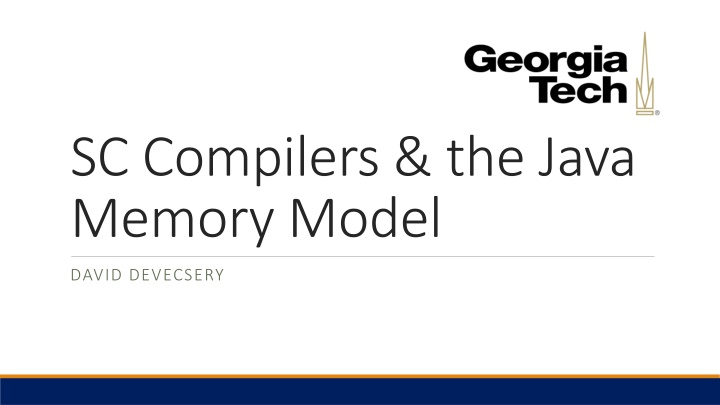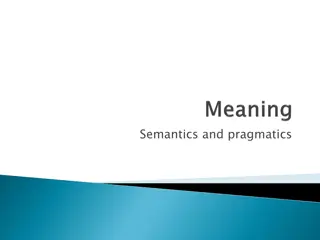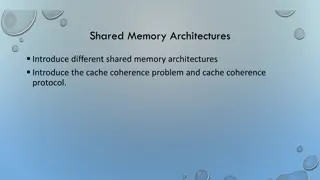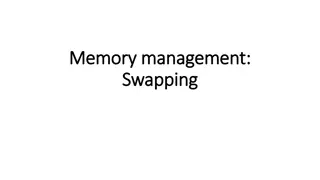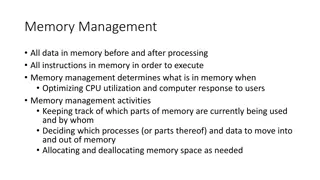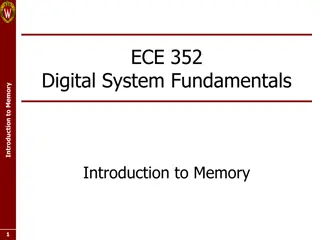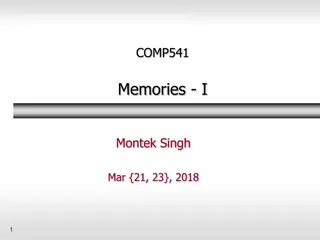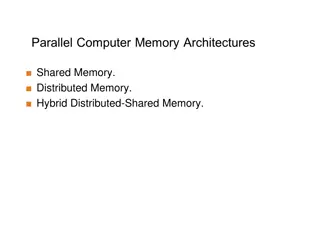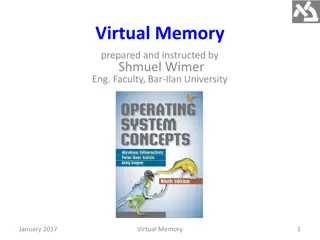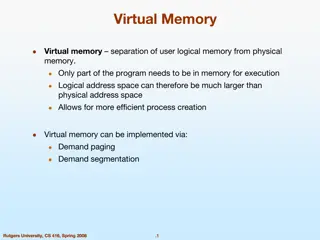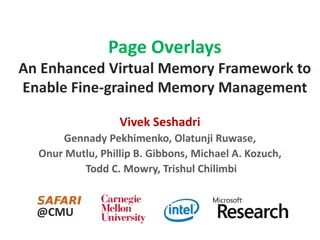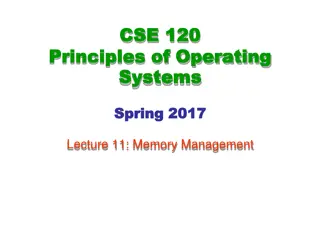C++11 Memory Model Semantics
T6he implications of C++11 memory model semantics, focusing on atomic sequential consistency and Acquire-Release relationships. Delve into the challenges and nuances of ensuring defined safety properties in multithreaded programming while optimizing performance.
Download Presentation

Please find below an Image/Link to download the presentation.
The content on the website is provided AS IS for your information and personal use only. It may not be sold, licensed, or shared on other websites without obtaining consent from the author.If you encounter any issues during the download, it is possible that the publisher has removed the file from their server.
You are allowed to download the files provided on this website for personal or commercial use, subject to the condition that they are used lawfully. All files are the property of their respective owners.
The content on the website is provided AS IS for your information and personal use only. It may not be sold, licensed, or shared on other websites without obtaining consent from the author.
E N D
Presentation Transcript
SC Compilers & the Java Memory Model DAVID DEVECSERY
Administration! Submit your discussion preferences On Canvas! Project Proposal info coming soon!
Clarification C++11 atomic sequential consistency semantics Creates a global ordering w.r.t. all other SC memory accesses Also: acts as an acquire if on a load AND/OR a release if on a store
C++11 SC Accesses Can we see a==1, b==0, c==1, d==0 in C++11? Initial: y = 0, x = 0 Thread 1 store(x, 1, SC) Thread 2 Thread 3 Thread 4 Acquire-Release Relation a = load(x, Acquire) b = load(y, Acquire) c = load(y, Acquire) d = load(x, Acquire) store(y, 1, SC)
C++11 SC Accesses Impossible. Must load from Store, since there is a complete HB chain from the store to the load. Can we see a==1, b==0, c==1, d==0 in C++11? Initial: y = 0, x = 0 Thread 1 store(x, 1, SC) Thread 2 Thread 3 Thread 4 Acquire-Release Relation a = load(x, Acquire) b = load(y, Acquire) c = load(y, Acquire) d = load(x, Acquire) store(y, 1, SC) Acquire-Release Relation SC Relation
The Java Memory Model (POPL05) Goals (according to the paper) provide balance between: Sufficient ease of use Transformations and optimizations Overall: DRF0-like memory model BUT, attempt to provide defined safety properties on a data-race
The Java Memory Model (POPL05) My opinion on goals: Poorly stated in paper, ease of use is misleading Really providing safetyfrom out-of-nowhere operations. These are securityneeds of the Java language (pointers/references can t come out of nowhere in your type-safe language!) Not easy to reason about from a programmers prospective! Goal: get these safety properties while minimally sacrificing performance
Defined behavior on Data-race? We want to remove out-of-nowhere reads This shouldn t happen: Initial: x = y = 0 In DRF0, this is allowed Thread 2 r2 = y; x = r2; Thread 1 r1 = x; y = r1; How can we disable this, but not impact compiler optimization? Disallow: r1 == r2 == 42
Lets try a happens-before memory model Simple rules: a read (r) from variable v cannot read from a write (w) to v that happens after that read (e.g. r ?? w) If there is a write w to v such that w ??w ?? r, then r cannot read from w In English: A read: cannot read from a write that happens after it must not read from an old write (a write that has another write to the same variable happen after it)
Does the Happens-before memory model solve our problem? Consider this program: Yes: Initial: x == y == 0 The write of 42 to y could happen before r1 = x, and the write of 42 to x could happen before r2 = y (There is no happens-before relation in this code) Thread 2 r2 = y; if (r2 != 0) x = 42 Thread 1 r1 = x; if (r1 != 0) y = 42; Is: y = 42, x = 42 possible?
What should the JMM allow? Consider this program: Initial: x == y == 0 Should x == y == 42 be possible? Thread 2 r2 = y; if (r2 != 0) x = 42 Thread 1 r1 = x; if (r1 != 0) y = 42; No: This program doesn t have a data- race, the assignment of x and y will never be run! Is: y = 42, x = 42 possible?
Instead, Java uses a notion of causality Logically, there must exist a valid execution which can create these operations. But, how to construct these executions A well formed execution consists of a set of validly committed actions Paper gives a set of formal rules for committing actions
Execution rules (in English) E is the set of all valid executions, with all valid actions Executions have properties: The execution obeys intra-thread consistency Its program-order happens- before ordering can be re-ordered based on allowed Java optimizations Iteratively construct an execution ?? by selecting a set of committed actions ??.
Approximate execution rules (in English) Rules for commit selection: 1. The actions committed on step i (??) must be actions in the full execution 2. The happens-before relations in ?? must exist in the full execution 3. The synchronizations in ?? must exist in the full execution 4. Values written in ?? must be the values written in the full execution 5. All visible writes in ?? must be visible in the full execution 6. Any read must see a prior committed write. 7. Any read in the most recent commit (i i-1) must see a prior write, but the write could be different then in the full execution 8. Given a synchronization operation, if there is an acquire-release pair in ?? then that pair must be present in all future steps (?? where j>i)
Putting it together. Lets walk through an example of allowed behavior Initial: x == y == 0 Action Final Value First Committed in Thread 2 r2 = y x = r2 Thread 1 r1 = x y = 1 ?1 x = 0 0 ?1 y = 0 0 ?1 y = 1 1 Allow: r1 == r2 == 1 ?2 r2 = y 1 ?3 x = r1 1 ?4 r1 = x 1
Putting it together. Can you show how this behavior is illegal? Initial: x == y == 0 Action Final Value First Committed in Thread 2 r2 = y if (r2 != 0) x = 42 Thread 1 r1 = x if (r1 != 0) y = 42 ?1 x = 0 0 ?1 y = 0 0 We can t run this step, why? ?1 y= 42 42 It depends on r1 != 0, which hasn t happened yet. This violates the intra-thread semantics of the program, and is not a valid execution Allow: r1 == r2 == r3 == 2 Hint: Consider possible transformations / reorderings
Putting it together. Can you show how this behavior is legal? Initial: a = 0, b = 1 Thread 2 r3 = b a = r3 Thread 1 r1 = a r2 = a if (r1 == r2) b = 2 Allow: r1 == r2 == r3 == 2 Hint: Consider possible transformations
Putting it together. Can you show how this behavior is legal? Initial: a = 0, b = 1 The model does not disallow hoisting b=2. Action Final Value First Committed in Thread 2 r3 = b a = r3 Thread 1 r1 = a r2 = a if (r1 == r2) b = 2 ?1 a = 0 0 ?1 b = 1 1 ?1 b = 2 2 ?2 r3 = b 2 ?3 a = r3 2 Allow: r1 == r2 == r3 == 2 ?4 r2 = a 2 Hint: Consider possible transformations / reorderings ?5 r1 = a 2
Putting it together. Can you show how this behavior is legal? Initial: a = 0, b = 1 Action Final Value First Committed in Thread 2 r3 = b a = r3 Thread 1 r1 = a r2 = a if (r1 == r2) b = 2 ?1 a = 0 0 ?1 b = 1 1 Why can this run? ?1 b = 2 2 ?2 r3 = b 2 r1 and r2 = a, so there exists an execution in E where b = 2 is executed ?3 a = r3 2 Allow: r1 == r2 == r3 == 2 ?4 r2 = a 2 Hint: Consider possible transformations / reorderings ?5 r1 = a 2
Putting it together. intra-thread consistency of the JLS This transformation obeys the Can you show how this behavior is legal? Initial: a = 0, b = 1 Action Final Value First Committed in Thread 2 r3 = b a = r3 Thread 1 b = 2 r1 = a r2 = a if (true) ; ?1 a = 0 0 ?1 b = 1 1 Why can this run? ?1 b = 2 2 ?2 r3 = b 2 r1 and r2 = a, so there exists an execution in E where b = 2 is executed ?3 a = r3 2 Allow: r1 == r2 == r3 == 2 ?4 r2 = a 2 Hint: Consider possible transformations / reorderings ?5 r1 = a 2
What are your opinions of this model? Is it easy to reason about or understand? Do you think it accomplishes its goal well? Is it really reasonable? Does it allow optimizations? What does this gain over a purely SC implementation? What does an SC compiler give up?
Preview (next class) The JMM has problems. Its not simple to reason about It does disable important optimizations (and C++ does too)
What types of optimizations break SC? What breaks SC in an optimizing compiler? Reordering of dependentshared memory operations.
What optimizations break SC? Does this break SC? Initial: ready = false, a = null Thread 2 Thread 1 Thread 2 Thread 1 ready = true; a = new int[10]; a = new int[10]; ready = true; if (ready) a[5] = 5; if (ready) a[5] = 5;
What optimizations break SC? Is this valid in a DRF0 compiler? Initial: ready = false, a = null Reordering within the lock is still invalid, these another Thread 2 thread could access ready, then a without a lock! Thread 1 Thread 2 Thread 1 lock(m1) ready = true; a = new int[10]; unlock(m1); lock(m1); a = new int[10]; ready = true; unlock(m1) lock(m1) if (ready) a[5] = 5; unlock(m1) lock(m1); if (ready) a[5] = 5; unlock(m1)
What optimizations break SC? Does this transformation break SC? Why or why not? Initial: ready = false, a = null Thread 2 Thread 2 Thread 1 Thread 1 b = a z = b [10] c = a w = c[1] b = a z = b[10] a = new int[10] a = new int[10] w = b[1]
What optimizations break SC? Does this transformation break SC? Why or why not? Initial: ready = false, a = null Thread 2 Thread 2 Thread 1 Thread 1 b = a z = b + 10 c = a w = c[1] b = a z = b + 10 a = new int[10] a = new int[10] w = b[1]
What compiler transformations are SC? What rules guard safe reorderings? Every behavior of the transformed program is a behavior of the original program Transformations to shared memory are generally disallowed Some special cases Transformations to local memory (e.g. compiler introduced locals) are freely allowed
SC Preserving Transformations Redundant load: t = X; u = X => t =x; u = t; Forwarded load: X = t; u = X; => X = t; u = t; Dead store: X = t; X = u => X = u; Redundant store: t = X; X = t => t = X; Thread 1 Thread 1 b = a z = b + 10 c = a w = c[1] b = a z = b + 10 w = b[1]
Transformations that violate SC Ordering Relaxations Load -> Load Load -> Store Store -> Store Load -> Store Which ordering is being relaxed here? Thread 1 Thread 1 b = a z = b [10] c = a w = c[1] b = a z = b[10] w = b[1]
An SC Preserving LLVM Disable any non-SC preserving transformations Modify transformations to work on only provably non- shared variables (where appropriate) Overhead: 5.5% on SPEC2006, 3.4% on PARSEC and SPLASH-2 BUT, these results are using simple analysis to identify non-shared variables
Hardware support for SC transformations Introduce a speculation check for eager loads Can quickly check if a variable may have been modified since its last load Allows speculative optimizations (like CSE), as long as you guarantee that the variable wasn t modified before its use Very similar to Intel s TSX extensions Experiments done on a simulator Overhead drops to 2.2% on PARSEC and SPLASH-2 with support
Next Lecture A language that guarantees race freedom (making DRF0 hardware/software actually SC!) Problems with the C11 (and Java) Memory Models. They were made to enable as many optimizations as possible, and yet they don t!
